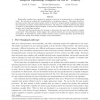Free Online Productivity Tools
i2Speak
i2Symbol
i2OCR
iTex2Img
iWeb2Print
iWeb2Shot
i2Type
iPdf2Split
iPdf2Merge
i2Bopomofo
i2Arabic
i2Style
i2Image
i2PDF
iLatex2Rtf
Sci2ools
152
click to vote
TJS
2002
2002
Adaptive Optimizing Compilers for the 21st Century
Historically, compilers have operated by applying a fixed set of optimizations in a predetermined order. We call such an ordered list of optimizations a compilation sequence. This paper describes a prototype system that uses biased random search to discover a program-specific compilation sequence that minimizes an explicit, external objective function. The result is a compiler framework that adapts its behavior to the application being compiled, to the pool of available transformations, to the objective function, and to the target machine. This paper describes experiments that attempt to characterize the space that the adaptive compiler must search. The preliminary results suggest that optimal solutions are rare and that local minima are frequent. If this holds true, biased random searches, such as a genetic algorithm, should find good solutions more quickly than simpler strategies, such as hill climbing. 1 The Changing Landscape Each year, microprocessors, microcontrollers, and other...
| Added | 23 Dec 2010 |
| Updated | 23 Dec 2010 |
| Type | Journal |
| Year | 2002 |
| Where | TJS |
| Authors | Keith D. Cooper, Devika Subramanian, Linda Torczon |
Comments (0)

